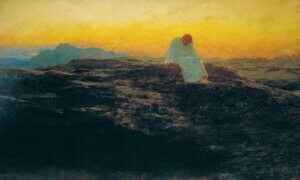
Living Lent
God of resurrection and life, you bring forth the first green of spring from the cold damp earth just as you brought forth Jesus from the darkness of the tomb. Help us to see your coming kingdom even as we walk in it now, always yearning toward new life in your glory yet to come. Amen
 I’ve been an Episcopalian all my life, and I grew up in the minority in a community of Roman Catholics, so I’m used to these questions: What are you giving up for Lent? What will be your Lenten fast? I’ve heard — and probably asked — these questions many, many times over the course of my life.
I’ve been an Episcopalian all my life, and I grew up in the minority in a community of Roman Catholics, so I’m used to these questions: What are you giving up for Lent? What will be your Lenten fast? I’ve heard — and probably asked — these questions many, many times over the course of my life.
And — maybe like you — I’ve “given things up” for Lent. I’ve fasted from chocolate, coffee, sweets, and wine. And I wonder whether this was really what Jesus was up to during his 40 days and nights in the wilderness. Have I grown in discipleship from these disciplines over the Lents of my lifetime? Is this the fast that God is calling us to in Lent? The prophet Isaiah would say no. Isaiah tells us that God wants an action-packed Lent, full of energy and positive initiative:
God doesn’t want us to humble ourselves, bowing our heads like a bulrush,
and to lying around in sackcloth and ashes?The fast that God chooses, says Isaiah, is action to loose the bonds of injustice,
let the oppressed go free, offer food to the hungry, satisfy the needs of the afflicted —
And break every chain that binds us — in ourselves and in the world around us.
THEN, says the prophet Isaiah, your light shall rise in the darkness
and your gloom be like the noonday.THEN the Lord will guide you continually,
and satisfy your needs in parched places,
and make your bones strong;AND THEN you shall be like a watered garden,
like a spring of water, whose waters never fail.
Holy Fast

The prophet Isaiah is very clear about what a holy fast looks like — it’s all about action, not about having others admire our performance of self-denial. It’s about living — and being — in a new way. Was Jesus suffering in the wilderness those 40 days and nights? Maybe. Scripture tells us that he was tempted — he wrestled with hard ideas like earthly power, ego, control over his future, obedience to the life he was choosing. But did he give up chocolate — or more likely in his Ancient Near East context, dates, olive oil, or wine? I don’t think self-denial was the focal point of Jesus’ experience in the wilderness, even though the gospels said that he fasted. Jesus was working during that time. Jesus was preparing himself for his own earthly ministry in the wilderness, and Lent is the time we prepare for our own earthly ministry — what comes next for us after Easter.
So how do we use Lent as a time to focus and prepare for our earthly ministry, like Jesus and ancient Christians did? Do we do this by “giving up” chocolate or coffee? Maybe. But not because chocolate or coffee are innately bad or sinful, or because they are pleasures we need to put aside while we “suffer” like we might imagine Jesus did. We don’t need to give up desserts or sweets or wine because they are bad or because God doesn’t want us to enjoy ourselves — but we could give up anything that gets in the way of who we want to be as Christians. We can give up things — or adopt disciplines — that help us focus on our commitment to live as disciples of Jesus, and to prepare for the earthly ministry we want to engage.
How to Fast
Jesus tells us how to fast in our reading today — not by suffering and disfiguring our faces so that other people can tell we’ve given up chocolate, or wine, or cake, but by focusing our attention on God, because God knows our best selves and will help us get there if we pay attention, and remove any distractions from our environment.
When I think of Lent, I think of one of my favorite Easter hymns, Now the Green Blade Riseth, written by John McCleod Campbell Crum in England in 1926 while Crum was a canon at Canterbury Cathedral in England. The imagery of Jesus’ resurrection in the hymn is drawn directly from John 12:23, here in the King James translation Crum used:
And Jesus answered them, saying, the hour is come, that the Son of man should be glorified.
Verily, verily, I say unto you, except a corn of wheat fall into the ground and die, it abideth alone: but if it die, it bringeth forth much fruit.
 What does a grain of wheat lying in the cold, dark ground do? It doesn’t hibernate. It’s not dormant. It’s not denying itself the nutrients it needs to become wheat. Instead, it is nourishing itself. It is preparing for its next stage. It is taking on water and nutrients from the soil, and sprouting and greening in its seed sheath:
What does a grain of wheat lying in the cold, dark ground do? It doesn’t hibernate. It’s not dormant. It’s not denying itself the nutrients it needs to become wheat. Instead, it is nourishing itself. It is preparing for its next stage. It is taking on water and nutrients from the soil, and sprouting and greening in its seed sheath:
Now the green blade riseth, from the buried grain
Wheat that in dark earth many days has lain;
Love lives again, that with the dead has been:
Love is come again like wheat that springeth green.
Yes, we contemplate our mortality during Lent, but mortality itself is about life, and hope, celebration, preparation, and holy light — not a time of sackcloth and ashes, wearing suffering faces so that others can tell by looking at us that we’ve given up dessert. If we were not mortal, we would not be alive. If we were not mortal we wouldn’t be able to use Lent to prepare for our earthly ministry, taking on water and nutrients, growing with our preparation like the wheat in its sheath.
As we contemplate our mortality during Lent, we necessarily contemplate and celebrate life itself, preparing for our earthly ministry. We remember this big purpose of Lent with a cross on our foreheads in ashes, which have long used as natural fertilizer for plant growth. As we pray before the imposition of the ashes for self-denial during Lent, let’s deny ourselves the vanity of showing others how we suffer in our self-denial, reaching out in stead to relieve the suffering of others. The cross of ashes reminds us that God is with us, nourishing and guiding us, as we walk and work through these forty days. God has work for us to do! Amen
